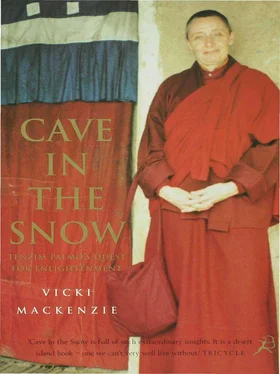She kept refining her search, seeking the exact path to suite her needs. A few months later she came across a book by Nagarjuna, the famous second-century Buddhist saint and philosopher, and in it found a definition of a Bodhisattva, the ’spiritual hero’ who elects to forsake Nirvana in order to return over and over again to this world to help free all sentient beings. ‘Immediately I knew. That’s what I want! That’s the goal! To do it not for oneself but out of compassion for all beings. The idea of being a Bodhisattva really resonated.’
The revelation of the exact avenue she wanted to take brought with it, however, one enormous problem. Nagarjuna, the founder of Mahayana Buddhism, the ‘Big Vehicle’, was revered and followed primarily in Tibet. And Tibetan Buddhism in the sixties was almost unknown and what was known was not liked. Stories had filtered out of Tibet, brought by those intrepid travellers who had managed to steal into the Forbidden Country, barred to outsiders – stories of magic and psychic phenomena which had become more fantastic in the telling. Lamas could ‘fly’, could materialize and dematerialize things at will, they could turn themselves into animals or whatever form they wished, they could travel improbable distances in next to no time by a strange trance-like jumping method. In Tibet there were spirits and genies and alien-looking idols with many arms and legs, fangs and bulging eyes. As a result Tibetan Buddhism was dismissed by the largely intellectual members of the London Buddhist Society as shamanistic, esoteric and basically degenerate. Unlike the chaste lines of Zen and the straight dogma of the Theravada, Tibetan Buddhism was simply too exotic, too odd. No one thought it would ever catch on.
At this point Tenzin Palmo, as a new and keen member of the Buddhist Society, promptly turned her back on Tibetan Buddhism and all it stood for. But it was not to let go. While she was browsing through yet another book she came across a brief description of the four schools of Tibetan Buddhism Nyingmapa, Sakya, Gelugpa and Kargyupa. ‘When I read the word “Kargyupa” a voice inside said, “You’re Kargyu.” And I said, “What’s Kargyupa?” and the voice said, “It doesn’t matter, you’re Kargyupa.” And my heart dropped. Being a Tibetan Buddhist was the last thing I wanted to be.’
Throughout Tenzin Palmo’s story this same voice was to make itself heard again and again at strategic points, guiding her, warning her, steering her in the right direction. She always heeded it, regardless of what her head might be telling her. ‘Actually it’s been pretty hard to ignore – it’s made itself fairly strong at times,’ she said.
Following the dictates of the Voice, Tenzin Palmo contacted the only person she knew in London who had any knowledge of Tibetan Buddhism, who, over afternoon tea, handed her the Evan-Wentz biography of Milarepa, Tibet’s most beloved poet-saint, cave-meditator par excellence and founder of the Kargyupas. It was a riveting tale. Milarepa was a swashbuckling spiritual hero of the eleventh century who had led a spectacularly disreputable youth during which he had practised black magic to avenge his family’s wrongs, killing several people in the process. Finally seeing the error of his ways he had sought out a guru, the renowned Marpa the Translator, who had brought the Buddhist texts from India, beseeching him to give him the Saving Truths. Marpa took one look at the young reprobate standing before him and promptly set him about the Herculean task of building a high stone tower. When the task was completed Marpa surveyed the work and brusquely told Milarepa to dismantle it replacing each stone to the place it had come from. This process was repeated four times until Milarepa, bleeding and almost broken, had expiated his foul deeds and proven his determination. Marpa now bestowed on him the secret initiations and teachings he yearned for.
Armed with these, a staff, a cloak, a bowl and nothing else, he disappeared into the Mountain of Solitude where, freezing cold and with nothing to eat but nettles, his body became skeletal and his flesh turned entirely green. His meditations worked, however, because he learnt to raise the ecstatic mystic heat, keeping him warm in those sub-zero temperatures, and farmers reported seeing him flying over the valleys. When, after years of dedicated effort, he finally emerged to teach, flowers rained down and rainbows appeared in the sky.
All worldly pursuits have but one unavoidable and inevitable end, which is sorrow:
Acquisitions end in dispersion; buildings in destruction; meetings in separation; births in death.
Knowing this one should, from the very first, renounce acquisition and heaping up, and building and meeting,
And, faithful to the commands of an eminent guru, set about realizing the Truth, which hath no birth or death.
That alone is the best science.
His words were recorded by the faithful disciple Rechungpa, who was to have an important part to play much later in Tenzin Palmo’s life.
When Tenzin Palmo put the book down she was converted. While such esoteric stuff may have been anathema to the respectable and conventional members of the Buddhist Society, Tenzin Palmo was in her element. ‘The talk of the Pure Lands, of spirit realms, of heavens and hells that I found in that book blew my mind. These were levels of existence that I knew about from the seances at home. After all, I was brought up with tables floating around the room! And to me concepts such as Milarepa flying were completely feasible because I’d done the same thing myself as a child when I was sick and went out of body. But these elements were completely lacking in Theravada and Zen. Those paths were so rationalistic it bothered me. No one was mentioning spirit. I have a pretty logical mind and I’m not gullible, but when I come across genuine expressions of higher human potential I take notice,’ she said.
The obvious next step was to find a teacher, ‘an eminent guru’as Milarepa had put it, to guide her, as he had found Marpa. ‘I knew I had to look for a teacher, not just any teacher, but the one,’ she said. ‘I don’t think I ever questioned the fact that I would find him, that he would be Kargyu and that he would be in India because that was where all the Tibetan refugees had gone. I made up my mind then that I would go there to look for him,’ she added. But this was not to happen yet.
In the meantime life was not all serious spiritual inquiry. Tenzin Palmo had another side. She was a teenager, she was pretty, she had long curly hair and was described as ‘bubbly’ by those who knew her. As she had grown older she had not only got used to being in a female body but had actively begun to enjoy it. She had discovered boys and they had certainly discovered her. Life in the heart of London was fun. It was the early sixties, the time of Elvis Presley, Ricky Nelson, Beatniks, Radio Luxembourg and rock’n’ roll. The cult of youth was just beginning, and Tenzin Palmo threw herself into it with all the enthusiasm she could muster.
‘I wore stiletto heels, and pretty clothes, went to jazz clubs and loved dancing. I was a great Elvis Presley fan (he was my big renunciation when I became a Buddhist!). In fact I had a very hectic social life and had lots of boyfriends, especially Asians. Funnily enough, I was never attracted to Western men. One thing I was always completely sure about, though, I never wanted to get married. I was very clear about that. I can remember when I was sixteen and about to be a bridesmaid for the third time – a friend said, “Don’t do it! Three times a bridesmaid never a bride!” And I replied, “That’s a silly superstition but let’s hope it works, it will add that little bit extra.” I wanted to be independent. I didn’t want to have my head filled with thoughts of one person.’
Читать дальше












